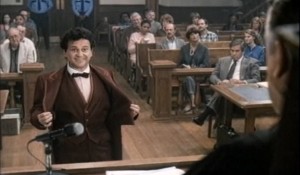Classic Legal Movie Gets Shout-Out From D.C. Circuit
"[O]ral arguments do not tend to disrupt the court’s operations (well, arguably)."
 That ‘harangue’ and ‘oration’ may not roll off the average person’s tongue today does not alter their possession of a settled meaning around public speeches…. It is true, as their dictionary definitions show, that ‘harangue’ and ‘oration’ can cover different facets of public speeches — ‘orations’ can include formal speeches, while ‘harangues’ can include angry or vehement speeches. But we are interpreting a statute, not restating a dictionary. Our search here is not for every facet of ‘harangue’ or ‘oration,’ but their meaning within the statute at issue… An oral argument, for example, could be considered a public speech within the Supreme Court. But oral arguments do not tend to disrupt the court’s operations (well, arguably).
That ‘harangue’ and ‘oration’ may not roll off the average person’s tongue today does not alter their possession of a settled meaning around public speeches…. It is true, as their dictionary definitions show, that ‘harangue’ and ‘oration’ can cover different facets of public speeches — ‘orations’ can include formal speeches, while ‘harangues’ can include angry or vehement speeches. But we are interpreting a statute, not restating a dictionary. Our search here is not for every facet of ‘harangue’ or ‘oration,’ but their meaning within the statute at issue… An oral argument, for example, could be considered a public speech within the Supreme Court. But oral arguments do not tend to disrupt the court’s operations (well, arguably).
— Judge Janice Rogers Brown of the D.C. Circuit, in a decision upholding the law banning protestors from making a ‘harangue’ or ‘oration’ in front of the Supreme Court. The case stems from the arrest of five protestors who interrupted the Court’s proceedings on April 1, 2015. They argued the statute’s ‘harangue’ or ‘oration’ language was unconstitutionally vague, but the panel disagreed. Judge Brown went on to cite a classic legal movie, My Cousin Vinny, saying, “Don’t talk to me sitting in that chair! . . . When you’re addressing this court, you’ll rise and speak to me in a clear, intelligible voice.”
Sponsored

Generative AI at Work: Boosting e-Discovery Efficiency for Corporate Legal Teams

AI Presents Both Opportunities And Risks For Lawyers. Are You Prepared?

Law Firm Business Development Is More Than Relationship Building


Curbing Client And Talent Loss With Productivity Tech








